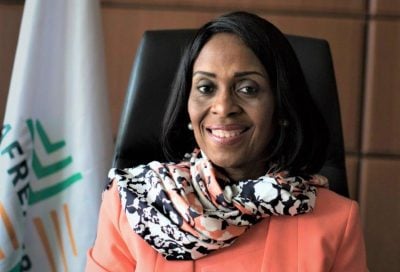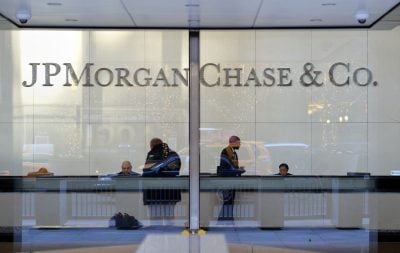“We have provided all the necessary infrastructure that should enable us to make a cashless nationwide journey,” Godwin Emefiele, governor of the Central Bank of Nigeria (CBN), told the audience at a workshop on 25 October celebrating a year since the launch of the country’s central bank digital currency (CBDC), the eNaira.
Emfiele also said that with the experience that it is gaining, Nigeria could become a knowledge source for the world on CBDCs as central banks develop their plans to launch digital currencies.
Africa’s first central bank digital currency
The eNaira was launched on 25 October 2021, making it one of just four CBDCs in the world and the first in Africa.
CBDCs differ from cryptocurrencies, such as bitcoin, as they are issued and backed by states. They also differ from mobile money apps, as they operate on a peer-to-peer basis – a customer can make a payment to a merchant using the eNaira directly without the need to go through an intermediary.
In addition, the value of the eNaira is exactly the same as that of the cash naira – it does not rise or fall independently in relation to other currencies.
Boosting inclusion is one of the principal aims of the digital currency. It is aimed at integrating millions of unbanked Nigerians – some 55% of the adult population – into the banking sector by providing a means to make payments directly from an e-wallet on their phones, without needing to go through intermediaries.
Users can also receive direct payments for welfare programmes.
At the time of the launch, Emefiele forecast that the digital currency could boost GDP by as much as $29bn over 10 years. Amongst other advantages is expected to boost commerce by making retail transactions more seamless in places such as petrol stations and supermarkets.
It was also designed to facilitate cross-border trade and in-bound remittances from Nigerians in the diaspora by providing a cheaper and easier way of making payments.
Towards a cashless economy
Emefiele made his 25 October 2022 speech at a one-day workshop in Lagos entitled “Leveraging Innovation for Inclusive Growth and Development: The eNaira Advantage”.
In it, he stressed that the introduction of the digital currency was an “iterative” process – what had happened so far was a “step, not a destination”. But the ultimate destination was, he said, a cashless economy in Nigeria.
“I know that those who doubt us will say a cashless economy is unobtainable,” he said. “Yes, it is true, but Nigeria must move from being a predominantly cash economy to being a predominantly cashless economy.”
He recounted the steps that had been taken to foster the growth of a cashless economy in Nigeria, including the adoption of the Bank Verification Number, the decision in 2017 to launch a CBDC and adoption of measures to promote the use of electronic payment systems in Anambra, Abia, Lagos, Ogun, Kano and Rivers states.
Announcements would be made in the coming months to make the cashless economy go nationwide, he said, while additional functionalities would be added to the eNaira.
Nigeria as a knowledge hub for the world on CBDCs
Nigeria’s place as an early adopter of a CBDC is positioning it as an educational hub for knowledge acquisition on CBDCs, claimed Emefiele.
Knowledge-sharing sessions have been carried out with the IMF and African central banks in recent months, and the CBN is taking steps to build its staff competence.
This digital finance programme is “poised to be a hub for knowledge generation in digital assets in Africa, building competences in fintech, blockchain technology, decentralised finance, central bank digital currencies, financial innovation, digital financial literacy, red tape and risk amongst others, limiting vulnerability of the financial system to cyber attacks and fraud,” he said.
In addition, the research department of the CBN has recently produced compendium of research outcomes comprising research 38 articles, he told the audience.
“These articles contain theoretical and empirical insights into the likely impacts CBDCs and fintechs will have on the Nigerian economy and how risks will be mitigated,” he said.
How good is progress of eNaira?
While Emefiele was upbeat on take-up of the digital currency, Bloomberg reported that less than 0.5% of Nigerians are using the eNaira.
“For the moment, the eNaira continues to struggle, especially among the poorest communities it’s targeting,” wrote Anthony Osae-Brown, Mureji Fatunde, and Ruth Olurounbi.
The reasons they found for this included the need to educate Nigerians about the digital currency, lack of incentives for banks to market it and suspicion of the CBN’s project among millennials and Generation Z, the main users of cryptocurrency.
Many Nigerians have taken to putting their cash into cryptocurrencies such as bitcoin to protect their savings against naira depreciation – the value of the naira has almost halved against the dollar since January, helping to fuel surging inflation. But the eNaira, because it has the same value as the cash naira, does not afford this possibility of a safe haven.
However, as the authors also report, the relatively low adoption rate to this point is probably not unusual for countries in the early phases of launching a digital currency, and the CBN remains optimistic that it can raise the number of users from 1m to 8m by next year.
Perhaps all the eNaira needs is “a little push from the government”, as Kingsley Obiora, deputy governor in charge of economic policy at the CBN, said at the “Leveraging Innovation for Inclusive Growth” event.
Want to continue reading? Subscribe today.
You've read all your free articles for this month! Subscribe now to enjoy full access to our content.
Digital Monthly
£8.00 / month
Receive full unlimited access to our articles, opinions, podcasts and more.
Digital Yearly
£70.00 / year
Our best value offer - save £26 and gain access to all of our digital content for an entire year!
 Sign in with Google
Sign in with Google 



